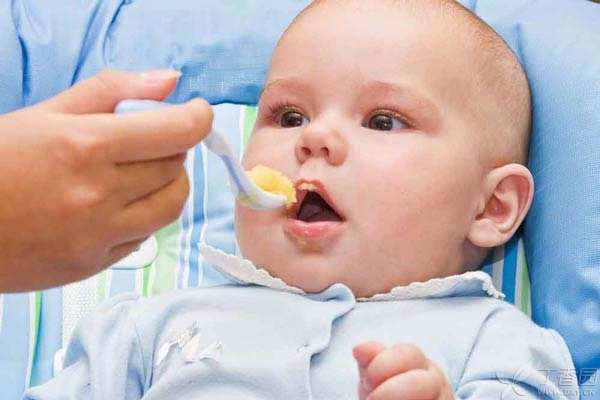
Every day of the baby brings many surprises to parents. Generally, the first tooth erupts around 6 months old. April to June is a period of sensitive taste development. During this period, the baby also begins to express its preference for various foods, which is the best time to add supplementary foods.
However, babies often cannot adapt to spoon feeding at the beginning and refuse to use it. Sometimes, for convenience, parents will chew the food directly on the dining table and feed it to the baby. Especially grandparents will prefer to feed it like this, kissing the child’s face by the way, making the family happy.
But is it really good for children?
It hinders the exercise of children’s chewing function.
The baby’s gums and gums gradually develop under the stimulation of rough food. After eating supplementary foods, the baby will try to chew food with gums and learn step by step.
The development of masticatory function is conducive to jaw development and deciduous tooth eruption. At the same time, training children to eat by themselves can exercise fine hand movements, promote brain development and cultivate correct eating habits.
If the baby is allowed to accept the food chewed by adults, the oral cavity will not be stimulated with sufficient intensity, which may lead to delayed eruption of deciduous teeth.
Therefore, although it is very hard to feed babies when they first receive weaning food, they should also be fed with tableware from the beginning, instead of directly feeding mouth to mouth.

Mouth-to-mouth feeding can spread diseases.
Some pathogenic bacteria often exist in the oral cavity of adults. However, infants’ oral mucosa is immature and has low defense function, which is easy to be damaged by food. If directly fed through mouth-to-mouth, pathogens invade children’s bodies through saliva, which can lead to the spread of diseases.
If you feed mouth to mouth every day, you are more likely to spread diseases. These diseases include:
1. Gastritis
Chronic gastritis is caused by a bacterial infection called Helicobacter pylori. This bacterium can live in the patient’s gastric juice for a long time and gradually erode the gastric mucosa, causing pantothenic acid, belching, abdominal pain and other symptoms. Severe long-term infection may lead to gastric ulcer, gastric perforation and even canceration.
Due to the slow progress of the disease, the initial symptoms of adult carriers are not obvious and the cognitive level is low.
The disease can be transmitted through saliva. If patients with stomach diseases or parents in the family do not know that they are infected, oral feeding can significantly increase the risk of infection of children.
2. Dental caries
Oral streptococcus variant is a common pathogenic bacterium causing dental caries, which can be colonized in the oral cavity of patients with dental caries. If dental caries exists in the oral cavity of adults, it can be directly transmitted to children by saliva after chewing, endangering the baby’s deciduous teeth.
Because if the symptoms of adult dental caries are mild, parents will not specially check them, so not feeding orally is the best way to prevent transmission.

3. Syphilis
Syphilis among children abroad is often related to sexual assault, but it is not uncommon to report cases of oral syphilis among children caused by special feeding habits in China.
Syphilis patients in the active period due to pathogen reproduction, in oral mucosa damage caused by saliva contains a large number of infectious treponema pallidum. Oral feeding can be transmitted to children, causing syphilis infection. Children can show oral mucosal damage, systemic rash and other atypical reactions.
Among the 14 cases of non-sexual transmission of syphilis in children counted in 2011, 7 cases were infected by grandparents and chewed and fed orally: 3 cases were under 1.5 years old, 7 cases were 3-6 years old, and 4 cases were 7-11 years old.
Due to the increasing epidemic trend of syphilis in our country, patients are not treated in time, or they do not realize that the disease can be transmitted orally, which often endangers children’s bodies.
4. Respiratory diseases
Including pneumonia, bronchitis, and bacteria such as Haemophilus influenzae and Streptococcus pneumoniae may be colonized in the oral cavity of adults.
These two types of bacteria are bacteria prone to pneumonia in children, with high virulence and strong pathogenicity. Due to the perfect immune function of adults, they do not cause diseases. However, as children’s immune system is still in the development stage, contact with these bacteria may cause respiratory tract infection, which may seriously lead to pneumonia.
5. Eb virus
Eb virus is one of the causes of many malignant tumors (such as nasopharyngeal carcinoma), and can also cause infectious mononucleosis, burkitt lymphoma and other diseases.
The virus can be transmitted through saliva, and adult carriers can be asymptomatic. If fed orally, the risk of transmission to children can be increased.
Children infected with Eb virus for the first time can show infectious mononucleosis, symptoms such as high fever, hepatosplenomegaly, etc. Immunodeficiency children may have fatal consequences. Some children infected with Eb virus for the first time have no clinical symptoms, but the body cannot completely remove the virus, which will remain in the body and endanger health.
What if the food is too large?
Like long green vegetables, when the child is too young and the chewing function is not perfect enough, it is easy to get stuck with the child.
If the food is too big and the child is not convenient to bite and cannot bite continuously, he can buy a supplementary food scissor to cut the food to pieces. Or cut the food for children into small pieces before cooking.
Parents, or elders, should abandon the unscientific feeding method of mouth-to-mouth feeding when feeding their children. Let children live happily.
Responsible Editor: Haitang
